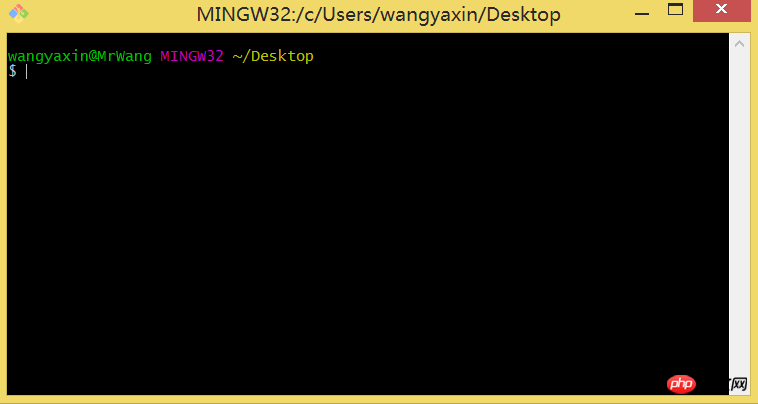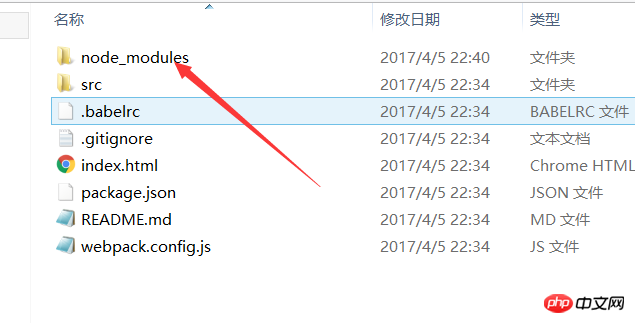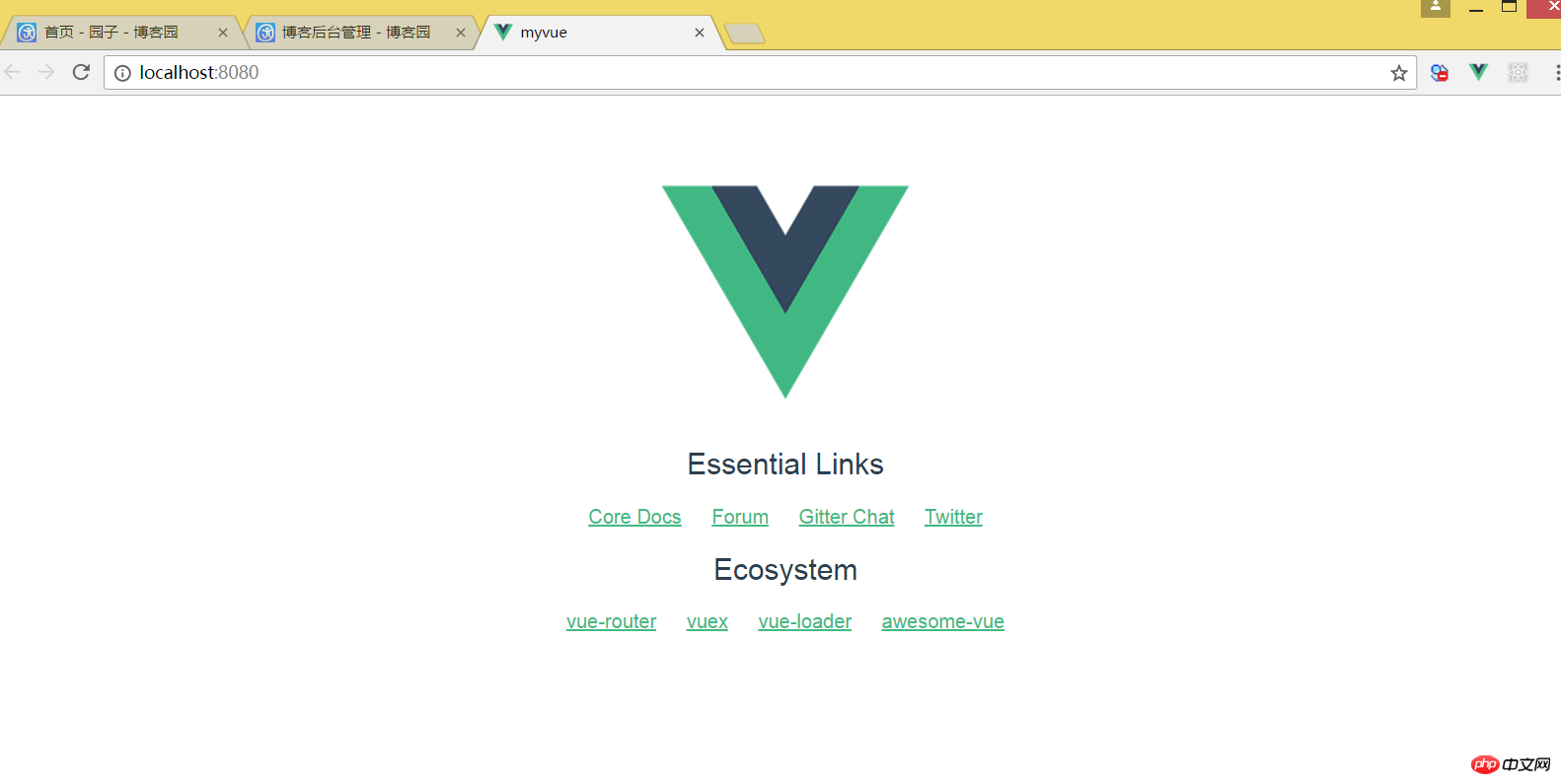How to build vue using vue-cli+webpack
This article mainly introduces how to use vue-cli webpack to build a vue development environment. Friends who need it can refer to it
Here we need to download node first, because we need to use npm package download. It is based on node
Without further ado, let’s go directly to the topic
Download node, and you need to download git at the same time. In the future, we will enter commands on git to build our vue environment
git uses linux commands
Don’t ask why, it just works, don’t you think so?
Windows system, after downloading git, we right-click on the desktop and you will see git Bash, click it, and then open git.
Git has many functions, and git can go to Push your files on github. Github is a very good warehouse management tool.
Okay, let’s start directly. After opening git,

will be displayed and then When we execute npm install webpack
, it will automatically download the latest version of webpack
Here we go directly to the topic, how to use vue-cli to build a vue development environment
Here we need to install vue-cli globally
Execute in gitnpm install vue-cli -g Install vue command environment
Executevue --versonCheck whether the installation is successful.
Display the version of vue, which means the installation is successful
This is a global installation
Now we enter on the command linevue init webpack-simple<The template name is the name of your project>,
Here we use webpack-simple to build it, because it does not have strict specifications, compared to most programs It's better for developers. I won't go into details about the difference between it and webpack here. If necessary, you can leave a message below and we will share it with you
My project name here is myvue
So I executevue init webpack-simple myvue
There will be a myvue folder on the desktop
We executecd myvueEnter Under our project

#you will find these files in the folder. This is the environment that vue-cli automatically builds for us
We executenpm install
At this time we need to wait for a while, npm is downloading some files based on node for us,

Then you You will find that there is an extra node-modules file, which contains some modules of node
Then we execute the command line npm run dev
vue automatically opens the browser , ran this vue project

The above is the text I compiled, I hope it will be helpful to everyone
Related articles:
About optimization configuration issues in Webpack
How to build Electron applications in Webpack
Insecure image path issues when using Angular4
The above is the detailed content of How to build vue using vue-cli+webpack. For more information, please follow other related articles on the PHP Chinese website!

Hot AI Tools

Undresser.AI Undress
AI-powered app for creating realistic nude photos

AI Clothes Remover
Online AI tool for removing clothes from photos.

Undress AI Tool
Undress images for free

Clothoff.io
AI clothes remover

Video Face Swap
Swap faces in any video effortlessly with our completely free AI face swap tool!

Hot Article

Hot Tools

Notepad++7.3.1
Easy-to-use and free code editor

SublimeText3 Chinese version
Chinese version, very easy to use

Zend Studio 13.0.1
Powerful PHP integrated development environment

Dreamweaver CS6
Visual web development tools

SublimeText3 Mac version
God-level code editing software (SublimeText3)

Hot Topics
 How to use bootstrap in vue
Apr 07, 2025 pm 11:33 PM
How to use bootstrap in vue
Apr 07, 2025 pm 11:33 PM
Using Bootstrap in Vue.js is divided into five steps: Install Bootstrap. Import Bootstrap in main.js. Use the Bootstrap component directly in the template. Optional: Custom style. Optional: Use plug-ins.
 How to add functions to buttons for vue
Apr 08, 2025 am 08:51 AM
How to add functions to buttons for vue
Apr 08, 2025 am 08:51 AM
You can add a function to the Vue button by binding the button in the HTML template to a method. Define the method and write function logic in the Vue instance.
 How to use watch in vue
Apr 07, 2025 pm 11:36 PM
How to use watch in vue
Apr 07, 2025 pm 11:36 PM
The watch option in Vue.js allows developers to listen for changes in specific data. When the data changes, watch triggers a callback function to perform update views or other tasks. Its configuration options include immediate, which specifies whether to execute a callback immediately, and deep, which specifies whether to recursively listen to changes to objects or arrays.
 What does vue multi-page development mean?
Apr 07, 2025 pm 11:57 PM
What does vue multi-page development mean?
Apr 07, 2025 pm 11:57 PM
Vue multi-page development is a way to build applications using the Vue.js framework, where the application is divided into separate pages: Code Maintenance: Splitting the application into multiple pages can make the code easier to manage and maintain. Modularity: Each page can be used as a separate module for easy reuse and replacement. Simple routing: Navigation between pages can be managed through simple routing configuration. SEO Optimization: Each page has its own URL, which helps SEO.
 How to reference js file with vue.js
Apr 07, 2025 pm 11:27 PM
How to reference js file with vue.js
Apr 07, 2025 pm 11:27 PM
There are three ways to refer to JS files in Vue.js: directly specify the path using the <script> tag;; dynamic import using the mounted() lifecycle hook; and importing through the Vuex state management library.
 How to return to previous page by vue
Apr 07, 2025 pm 11:30 PM
How to return to previous page by vue
Apr 07, 2025 pm 11:30 PM
Vue.js has four methods to return to the previous page: $router.go(-1)$router.back() uses <router-link to="/" component window.history.back(), and the method selection depends on the scene.
 How to use vue traversal
Apr 07, 2025 pm 11:48 PM
How to use vue traversal
Apr 07, 2025 pm 11:48 PM
There are three common methods for Vue.js to traverse arrays and objects: the v-for directive is used to traverse each element and render templates; the v-bind directive can be used with v-for to dynamically set attribute values for each element; and the .map method can convert array elements into new arrays.
 How to jump to the div of vue
Apr 08, 2025 am 09:18 AM
How to jump to the div of vue
Apr 08, 2025 am 09:18 AM
There are two ways to jump div elements in Vue: use Vue Router and add router-link component. Add the @click event listener and call this.$router.push() method to jump.






